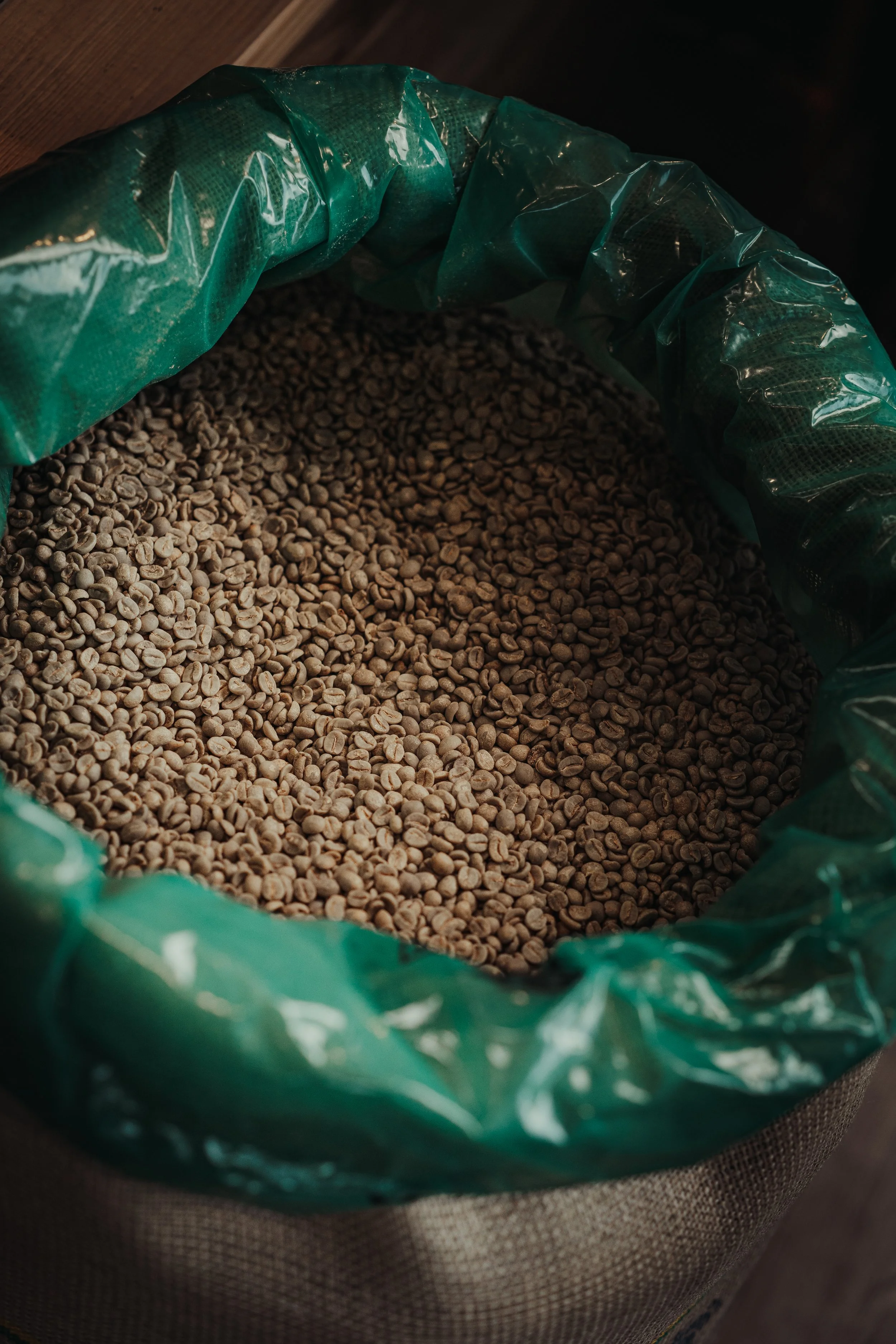RWANDA - Twongerekawa Coko
In 2009, eleven female coffee farmers including Thérèse Nyrangwabije, now president of the coop decided to transform what was being grown as ‘traditional’ coffee into something else.
Farmers in the Northern Province, in difference to the better known Lake Kivu area, were lesser known, and so used to selling their garden grown coffee by the side of the road to passing buyers. By carefully saving their money, investing in their own land and, with help from National Agricultural Export Development Board (NAEB), infrastructure, they formed what has gone on to become a very successful operation. They have 200 raised beds for drying, and employ 80 staff at eth washing station in the season. They also have a youth committee - they’re in charge of preparing the organic compost.
TWONGEREKAWA COKO Rwanda Location Coko sector, Gakenke District With 384 members now part of the cooperative, Thérèse is proud that 75% of members are women. This is a considerable increase from a couple of years ago. That development means they providing training and support on a number of topics, from small projects that bring in an income, to strategies for reducing soil erosion through planting trees and how to adapt for climate change. Harvesting occurs twice per month amongst the low density planting common to the area. Seedlings are also given away free to encourage and maintain plant vigour and quality of crop. Twongerekawa also have organic chickens and goats. They give chicken and hand eggs for free to farmers to fight malnutrition in the children. The coop is also now producing essential oils (eucalyptus, geranium) and plans to embrace eco-tourism through building eco-lodges.
Coffee here, once picked goes through a hand sorting on covered tables to hide the effects of the sun.
After an initial washing and pulping, the beans are subject to a double fermentation process that starts with a 12 hour dry fermentation and is completed with a 24 hour wet fermentation
Beans are then dried on raised beds for 18-22 days.
Dry milling is provided at NAEB (National Agricultural Export Development Board) in Kigali, in order to process and package the coffee.
Hibiscus, Sour Cherry, Vanilla, Cranberry
Whole bean - 200g.
In 2009, eleven female coffee farmers including Thérèse Nyrangwabije, now president of the coop decided to transform what was being grown as ‘traditional’ coffee into something else.
Farmers in the Northern Province, in difference to the better known Lake Kivu area, were lesser known, and so used to selling their garden grown coffee by the side of the road to passing buyers. By carefully saving their money, investing in their own land and, with help from National Agricultural Export Development Board (NAEB), infrastructure, they formed what has gone on to become a very successful operation. They have 200 raised beds for drying, and employ 80 staff at eth washing station in the season. They also have a youth committee - they’re in charge of preparing the organic compost.
TWONGEREKAWA COKO Rwanda Location Coko sector, Gakenke District With 384 members now part of the cooperative, Thérèse is proud that 75% of members are women. This is a considerable increase from a couple of years ago. That development means they providing training and support on a number of topics, from small projects that bring in an income, to strategies for reducing soil erosion through planting trees and how to adapt for climate change. Harvesting occurs twice per month amongst the low density planting common to the area. Seedlings are also given away free to encourage and maintain plant vigour and quality of crop. Twongerekawa also have organic chickens and goats. They give chicken and hand eggs for free to farmers to fight malnutrition in the children. The coop is also now producing essential oils (eucalyptus, geranium) and plans to embrace eco-tourism through building eco-lodges.
Coffee here, once picked goes through a hand sorting on covered tables to hide the effects of the sun.
After an initial washing and pulping, the beans are subject to a double fermentation process that starts with a 12 hour dry fermentation and is completed with a 24 hour wet fermentation
Beans are then dried on raised beds for 18-22 days.
Dry milling is provided at NAEB (National Agricultural Export Development Board) in Kigali, in order to process and package the coffee.
Hibiscus, Sour Cherry, Vanilla, Cranberry
Whole bean - 200g.
In 2009, eleven female coffee farmers including Thérèse Nyrangwabije, now president of the coop decided to transform what was being grown as ‘traditional’ coffee into something else.
Farmers in the Northern Province, in difference to the better known Lake Kivu area, were lesser known, and so used to selling their garden grown coffee by the side of the road to passing buyers. By carefully saving their money, investing in their own land and, with help from National Agricultural Export Development Board (NAEB), infrastructure, they formed what has gone on to become a very successful operation. They have 200 raised beds for drying, and employ 80 staff at eth washing station in the season. They also have a youth committee - they’re in charge of preparing the organic compost.
TWONGEREKAWA COKO Rwanda Location Coko sector, Gakenke District With 384 members now part of the cooperative, Thérèse is proud that 75% of members are women. This is a considerable increase from a couple of years ago. That development means they providing training and support on a number of topics, from small projects that bring in an income, to strategies for reducing soil erosion through planting trees and how to adapt for climate change. Harvesting occurs twice per month amongst the low density planting common to the area. Seedlings are also given away free to encourage and maintain plant vigour and quality of crop. Twongerekawa also have organic chickens and goats. They give chicken and hand eggs for free to farmers to fight malnutrition in the children. The coop is also now producing essential oils (eucalyptus, geranium) and plans to embrace eco-tourism through building eco-lodges.
Coffee here, once picked goes through a hand sorting on covered tables to hide the effects of the sun.
After an initial washing and pulping, the beans are subject to a double fermentation process that starts with a 12 hour dry fermentation and is completed with a 24 hour wet fermentation
Beans are then dried on raised beds for 18-22 days.
Dry milling is provided at NAEB (National Agricultural Export Development Board) in Kigali, in order to process and package the coffee.
Hibiscus, Sour Cherry, Vanilla, Cranberry
Whole bean - 200g.



